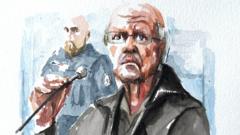The new panel, led by historians from both nations, seeks to address grievances stemming from Haiti's colonial past and propose recommendations for future relations.
**France and Haiti Establish Commission to Examine Colonial History**

**France and Haiti Establish Commission to Examine Colonial History**
Commission aims to explore the historical impact of France's colonial debt on Haiti's development.
In a significant move reflecting on colonial history, President Emmanuel Macron of France has announced the establishment of a commission dedicated to studying the complex Franco-Haitian relationship, particularly in the context of a hefty debt imposed on Haiti after it gained independence in 1804. The commission will consist of historians from both France and Haiti, tasked with making recommendations aimed at ameliorating future interactions between the two nations.
Upon gaining its independence, Haiti was compelled in 1825 to pay a staggering sum of 150 million gold francs to French slaveowners, which later was reduced to 90 million francs. This financial burden, not fully paid off until 1947, has been cited as a significant factor leading to Haiti's prolonged struggles with poverty and instability, making it one of the most economically challenged nations in the Americas.
Over the years, the debt has bred deep resentment among the Haitian populace, with many calling for France to provide reparations or at the very least acknowledge the historical injustices connected to this debt. Macron's comments underline the heart of the controversy, stating that the debt effectively "put a price on the freedom of a young nation," setting the stage for a tumultuous future marked by the consequences of colonial exploitation.
While France has publicly recognized the injustices of slavery in Haiti and beyond, the nation has largely shied away from discussing the prospect of repaying the independence debt. Macron's latest initiative, however, could represent a pivot towards a more constructive dialogue about the past and its lingering effects.
In a recent interview, Haitian author Monique Clesca emphasized the importance of acknowledging historical grievances, suggesting that it might help mitigate the ongoing discord and restore some footing for France’s relationship with its former colonies. Clesca also highlighted France's waning influence globally, stating that former colonies, including those in Africa, are increasingly distancing themselves from French authority.
As current conditions in Haiti systemically deteriorate, with rampant economic instability and escalating gang violence leading to over 5,500 deaths in 2024 alone, the transitional presidential council struggles to implement any meaningful democratic processes, including overdue elections. The commission's work may play a vital role in informing future policies that could lead not only to healing but also to a more stable governance structure in Haiti.
Upon gaining its independence, Haiti was compelled in 1825 to pay a staggering sum of 150 million gold francs to French slaveowners, which later was reduced to 90 million francs. This financial burden, not fully paid off until 1947, has been cited as a significant factor leading to Haiti's prolonged struggles with poverty and instability, making it one of the most economically challenged nations in the Americas.
Over the years, the debt has bred deep resentment among the Haitian populace, with many calling for France to provide reparations or at the very least acknowledge the historical injustices connected to this debt. Macron's comments underline the heart of the controversy, stating that the debt effectively "put a price on the freedom of a young nation," setting the stage for a tumultuous future marked by the consequences of colonial exploitation.
While France has publicly recognized the injustices of slavery in Haiti and beyond, the nation has largely shied away from discussing the prospect of repaying the independence debt. Macron's latest initiative, however, could represent a pivot towards a more constructive dialogue about the past and its lingering effects.
In a recent interview, Haitian author Monique Clesca emphasized the importance of acknowledging historical grievances, suggesting that it might help mitigate the ongoing discord and restore some footing for France’s relationship with its former colonies. Clesca also highlighted France's waning influence globally, stating that former colonies, including those in Africa, are increasingly distancing themselves from French authority.
As current conditions in Haiti systemically deteriorate, with rampant economic instability and escalating gang violence leading to over 5,500 deaths in 2024 alone, the transitional presidential council struggles to implement any meaningful democratic processes, including overdue elections. The commission's work may play a vital role in informing future policies that could lead not only to healing but also to a more stable governance structure in Haiti.




















